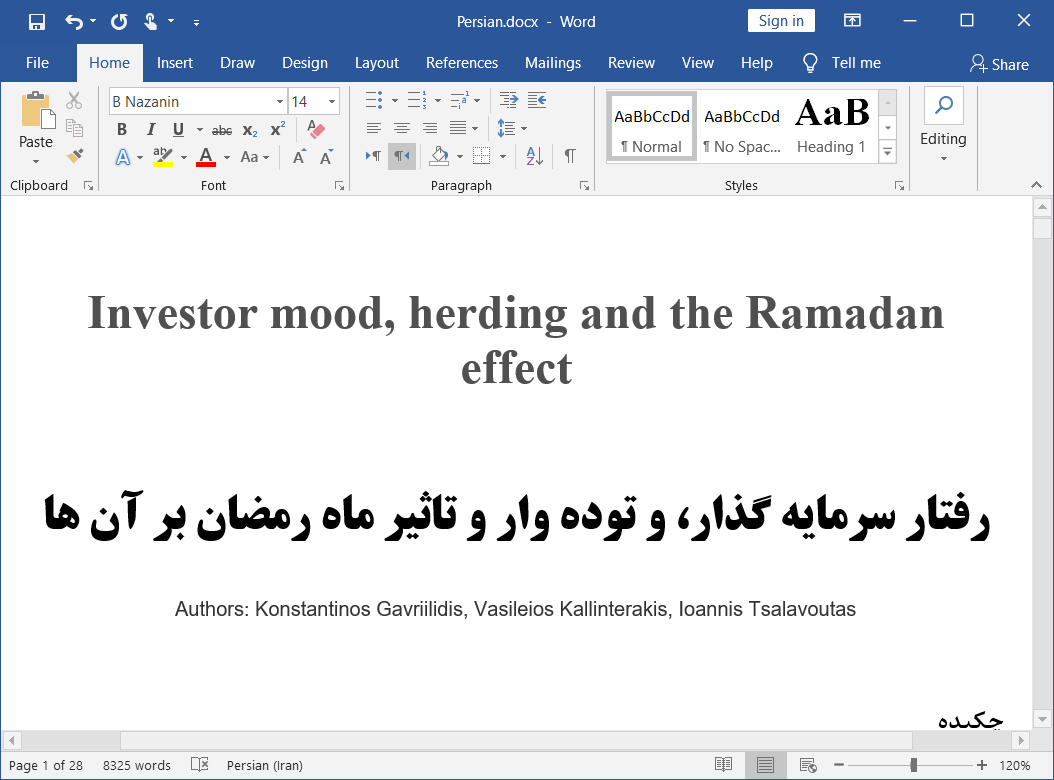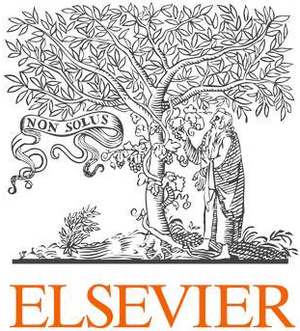رفتار سرمایه گذار، توده وار و اثر ماه رمضان بر آنها


18,500 تومانشناسه فایل: 13396
- حجم فایل ورد: 962.5KB حجم پیدیاف: 376.6KB
- فرمت: فایل Word قابل ویرایش و پرینت (DOCx)
- تعداد صفحات فارسی: 28 انگلیسی: 16
- دانشگاه:University of Stirling, Stirling Management School, Accounting and Finance Division, FK9 4LA, Scotland, UK
- ژورنال: Journal of Economic Behavior and Organization (1)
چکیده
در رابطه با شواهد موجود رفتار اجتماعی و توده وار، ما به تحلیل این پرداختیم که آیا رفتار مناسب در حین ماه رمضان نسبت به ماه های غیر رمضان سبب حفظ و نگهداری رفتار توده وار بیشتری می شود یا نه. در صورتی که مثالی از 7 کشور مهم مسلمان نشان داده شد، رفتار توده وار قابل توجهی در حین ماه رمضان در اکثر بازارهای نمونه ها موجود بود. علاوه بر این، نشان داده می شود که این رفتار نسبت به ماههای غیر رمضان برای اکثریت آزمایشها قویتر می باشد در نتیجه اهمیت آن هم در روزهای رمضان و هم غیر آن نشان داده می شود. بصورت کلی، اهمیت رفتار توده وار در حین/ خارج از ماه رمضان تعدادی متغیر را در این سطح بازارها مرتبط با متغیرهایی که رفتار بازارها، چه رفتار های بازارهای داخلی (سودهای بازار; حجم فروش بازار) و بین المللی (سودهای عاید شده از بازار آمریکا; اهداف سرمایه گذاران آمریکا; بحران اقتصادی جهانی) را منعکس می نماید نشان می دهد.
مقدمه مقاله
(متن کامل در فایل ورد موجود است)
از نقطه نظر بحث های اقتصادی اسلامی، دلائل منطقی برای تاجرها با افشای بازارهای موجودی اکثر کشورهای مسلمان موجود میباشد، که نتایج ما نقطه نظراتی مربوط به رفتار سرمایه گذارها در حین این ماه فراهم می آورد که بصورت نامتعارف سودهای زیادی دارد. برای مثال، در سالهای اخیر، موجی از محصولات سرمایه گذاری شده در کشور های مسلمان یا متفق با قوانین شریعه موجود بود. بخصوص اینکه، سرمایه گذارها بایستی سود خود را از فواید نامتعارف در حین ماه رمضان بدست آورند. اگرچه، الزاماتی بایستی در مورد ناپایداری پتانسیل رفتار توده وار که باعث افزایش خطر سیستماتیک می شود صورت گیرد.
جزئیات این مقاله بشرح زیر می باشد. بخش 2 منابع مرتبط با رفتار توده وار و رفتار های روانی فرضیات بیان شده می باشد. بخش 3 روش و داده ی بکار رفته را بیان می نماید. بخش 4 نتایج تجربی و بخش 5 نتیجه گیری را بیان می نماید.
ABSTRACT Investor mood, herding and the Ramadan effect
In view of evidence linking herding and social mood, we examine whether the positive mood documented during Ramadan translates into higher herding compared to non-Ramadan days. Drawing on a sample of seven majority Muslim countries, we report significant herding during Ramadan in most of our sample markets. Additionally, we show that herding appears significantly stronger within rather than outside Ramadan for most tests whereby its significance is manifested on both Ramadan- and non-Ramadan-days. Overall, herding significance within/outside Ramadan exhibits some variation in its levels across markets in relation to variables reflective of market states, both domestically (market returns; market volume) and internationally (US market returns; US investors’ sentiment; global financial crisis) market states.
Introduction
Religion is identified in several studies as a key factor underlying aspects of the economic and financial environment. From individual investors’ perspective, religion has been found to affect the propensity to save (Guiso et al., 2003; Renneboog and Spaenjers, 2012), the decision to invest in stocks (Renneboog and Spaenjers, 2012) and risk-attitudes (Miller and Hoffmann, 1995; Barsky et al., 1997; Hilary and Hui, 2009; Kumar, 2009; Kumar et al., 2011). From an aggregate market perspective, religion has been shown to affect IPO-underpricing (Kumar et al., 2011), economic growth (Barro and Mccleary, 2003) and creditor protection (Stulz and Williamson, 2003).
An area that has recently witnessed much research interest is that of investors’ mood and how the latter is shaped by religious occasions. In general, the evidence suggests that mood and emotions play an important role in investor behavior.1 In fact, Shu (2010) argues that the higher the complexity of a decision and the uncertainty of its outcome, the higher the impact of mood in decision making. A positive mood state can make investors more optimistic and willing to undertake riskier investment decisions (Wright and Bower, 1992). The proxy variables that have been used in the relevant studies in order to gauge social mood include weather (Saunders, 1993), biorhythms (Kamstra et al., 2003) and beliefs relating to Lunar phases or Friday 13th (Dowling and Lucey, 2005).
With respect to the role of religion in affecting investor mood and behavior, Pantzalis and Ucar (2014) examined the impact of the Easter week holiday on investors’ behavior in the U.S. This religious practice is found to cause investors distraction which may lead to delayed reaction to firm news. Frieder and Subrahmanyam (2004) examined the impact of the Jewish High Holy Days (i.e., Rosh HaShanah and Yom Kippur) on U.S. stock returns and dollar volume. During both Holy days there is a significant decline in dollar volume, while stock returns are significantly positive around Rosh HaShanah and significantly negative around Yom Kippur.2 Frieder and Subrahmanyam (2004) attribute these phenomena to Jewish investor sentiment.3 In addition, the positive mood effects of Ramadan on investor behavior have been identified in a series of studies which examined stock returns in Muslim countries (Al-Hajieh et al., 2011; Białkowski et al., 2012; Al-Khazali, 2014). In general, these studies suggest that stock returns are significantly higher during Ramadan than non-Ramadan days. Motivated by this evidence, the fact that Ramadan has been shown to be associated with overall positive mood, expressed through optimism and enhanced social interactions, and the well documented relation of social mood with herding (e.g., Prechter, 2001; Parker and Prechter, 2005; Olson, 2006), the first question we consider in this study is whether herding exists in majority Muslim countries during the Ramadan-month. Additionally, if herding does exist, we ask whether its existence is more significant within Ramadan days compared to non-Ramadan days. More specifically, given that Ramadan is characterized by increased positive mood and social interaction (both of which are contributing factors to herding) among Muslims, we would expect that this would lead to an increase on the level of herd behavior during the Ramadan period. A third question is whether controlling for a variety of (domestic and international) market states produces an effect over the relationship between herding and Ramadan given the sensitivity of herding to market conditions (see e.g. Chang et al., 2000). It is these three questions that our study addresses.
Our findings reveal evidence of herding significance within-Ramadan for most (five out of seven) of our sample markets. Furthermore, when herding is significant both within and outside Ramadan, its magnitude within-Ramadan is always higher than outside Ramadan. Overall, herding significance within/outside Ramadan exhibits some variation in its levels across markets in relation to variables that reflect domestic (market returns; market volume) or international (US market returns; US investors’ sentiment; global financial crisis) market states.
These results make original contributions to the literature on the effects of social norms on markets (e.g., Hong et al., 2004, 2005; Hong and Kacperczyk, 2009), herding (Prechter, 2001; Parker and Prechter, 2005; Olson, 2006) and Islamic finance in particular (Al-Hajieh et al., 2011; Białkowski et al., 2012; Al-Khazali, 2014). First, our findings are in line with social norm theory which argues that individuals follow the behavioral norms, beliefs and/or actions of other community members (Akerlof, 1980; Romer, 1984), with a focus on religious social norms. While previous Ramadan-related studies make inferences about the impact of Ramadan upon investors’ behavior indirectly (by examining Ramadan as a seasonal anomaly), we test directly for the Ramadan-effect over a widely documented manifestation of investors’ behavior, namely herding. As the first-ever study of the effect of religion over herding, our work contributes substantially to the wider literature on the role of religion in finance.4 Second, to the extent that social interactions and positive sentiment constitute Ramadan’s two key behavioral features, our work at the aggregate market level confirms prior evidence from microdata-based research (Hong et al., 2004, 2005; Liao et al., 2011) on the relevance of these two features to the propensity to herd. Third, our study helps showcase Ramadan as a sentiment-proxy when researching majority Muslim markets in terms of herding and other behavioral phenomena.5
From an Islamic finance viewpoint, useful implications arise for traders with exposure to equity markets of majority Muslim countries, as our results provide insight into investors’ behavior during a month which entails abnormally high returns. For example, in recent years, there has been a surge of products either investing in Muslim countries or compliant with Shariah principles.6 Specifically, investors might take advantage of the abnormal returns during Ramadan. However, they should be cautious about the destabilizing potential of herding which may lead to an increase of systemic risk.
The remainder of the paper is organized as follows. Section 2 discusses the relevant literature on herding and mood and states our hypotheses. Section 3 presents the method and the data employed. Section 4 discusses the empirical findings and Section 5 concludes.
- مقاله درمورد رفتار سرمایه گذار، توده وار و اثر ماه رمضان بر آنها
- پروژه دانشجویی رفتار سرمایه گذار، توده وار و اثر ماه رمضان بر آنها
- وضعیت روحی سرمایه گذار و توده واری و اثر ماه رمضان
- پایان نامه در مورد رفتار سرمایه گذار، توده وار و اثر ماه رمضان بر آنها
- تحقیق درباره رفتار سرمایه گذار، توده وار و اثر ماه رمضان بر آنها
- مقاله دانشجویی رفتار سرمایه گذار، توده وار و اثر ماه رمضان بر آنها
- رفتار سرمایه گذار، توده وار و اثر ماه رمضان بر آنها در قالب پاياننامه
- پروپوزال در مورد رفتار سرمایه گذار، توده وار و اثر ماه رمضان بر آنها
- گزارش سمینار در مورد رفتار سرمایه گذار، توده وار و اثر ماه رمضان بر آنها
- گزارش کارورزی درباره رفتار سرمایه گذار، توده وار و اثر ماه رمضان بر آنها
